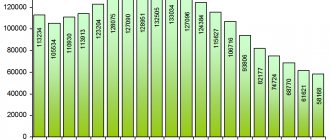Free legal consultation by phone:
8
Every minor child has the right to receive assistance in upbringing, education and maintenance from their parents. However, irresponsible fathers often shirk their duty, especially if they do not live together with the child. We will tell you in this article how to deprive parental rights for non-payment of child support
Is it possible to deprive parental rights for non-payment of child support?
Yes, this type of liability is prescribed in the RF IC, namely in one of the paragraphs of Article 69. However, it is worth making an allowance for the fact that there we are talking not just about arrears of alimony, but about deliberate evasion of their transfer.
The fact that the debtor does not pay alimony intentionally may be evidenced by the following actions on his part:
- concealment from bailiffs of place of work, residence, sources of available income;
- changing your own initials without approval from the Federal Tax Service;
- reluctance to work at those enterprises recommended to the debtor by the employment center.
The fact of reluctance to make payments is also confirmed by the bailiff’s decision to impose administrative liability on the debtor, as well as by materials from criminal proceedings (if such follows administrative punishment).
Benefits of deprivation of rights for the mother
If the ex-husband is deprived of his rights, the mother will have the opportunity to:
- independently raise a child;
- determine at his own discretion his living conditions, educational institution and city of residence;
- receive alimony payments;
- prohibit the ex-spouse from communicating with the baby;
- travel abroad with children without the permission of the ex-spouse.
However, it is worth considering that a man still has the opportunity to refute the decision of a government body and restore his rights. In addition, he can do this by conscientiously fulfilling his parental responsibilities and going to court. In this case, the woman will be deprived of many benefits (with the exception of alimony).
Bottom line: rights can be deprived for non-payment of child support payments only if there is a combination of non-participation in the child’s life. In this case, it is necessary to collect a strong evidence base in order for the court decision to be positive. The abolition of paternity only deprives rights; the obligations to support children remain unchanged.
Author: Maria Lutsenko, lawyer, especially for Mama66.ru
For a father deprived of parental rights
It is worth noting that deprivation of a father’s parental rights for failure to pay child support entails the inability to fully see the child.
But that is not all. If the child remains with the mother, then she can give him other initials, which will entail reissuing a birth certificate or passport (if the child is already 14 years old and has managed to receive this document).
The child’s mother can take him abroad at any time without the consent of the father, who has been deprived of parental rights. In the same way, approval from the mother for the adoption of a son (daughter) will not be required.
A father deprived of parental rights cannot enter the circle of heirs of his own child in the event of his death. At the same time, the child himself, upon the death of his father, is called upon to inherit on a general basis.
Please note that regardless of who the court relieved of rights (mother or father), the obligation to pay child support remains theirs.
If the father is deprived of parental rights, the child may be forcibly transferred to the mother. This will require the help of a bailiff, as well as a local police officer.
Documentation
Documents required to file a claim for deprivation of paternity for non-payment of child support.
| Documentation | Note |
| Child's birth certificate | Copy and original |
| Certificate of marriage and divorce | |
| Certificate from educational institution | Issued by an educational organization (school, kindergarten, etc.). In the certificate, employees indicate that the father:
|
| Certificate containing information about alimony | The document states:
|
| Witness's testimonies | Recorded in writing. Contain information that the father:
Witnesses can be:
|
For the mother with whom the child will remain
Usually in this case the father takes the child to live with him.
But if a woman is raising a son or daughter alone, then it is possible that the court, at the request of the guardianship authority, will decide to place the child in a specialized institution.
But it is possible that his grandfather, grandmother, and other close relatives will want to take guardianship of him. However, this is a separate procedure.
A woman deprived of parental rights may lose the right to register maternity capital. The fact is that it is provided if there are two or more children in the family. However, children for whom parental rights do not exist are not taken into account.
In the case of deprivation of parental rights, a woman will not be able to claim child care benefits, which is also important.
Consequences
First of all, the consequences affect the alimony defaulter. It is in relation to him that a number of restrictions and prohibitions will be adopted, depriving him of the opportunity to fully communicate with children. However, the changes will also affect the mother.
For the plaintiff
For the woman who filed the claim, the main consequence will be the official recognition of the father of her child as a stranger. In fact, she will be the only parent. This means that from now on she will have to bear the burden of education alone.
In addition, she will defend all the interests of the baby on her own. She will also have to resolve important issues in his life without the participation of her ex-husband.
For the alimony worker
Deprivation of parental rights for a child support defaulter entails:
- Complete lack of opportunity to communicate with your child. Before the deprivation of rights, he had the right to draw up a special schedule (legalized by the court), according to which the ex-husband could see the children. Once paternity is revoked, this right is excluded.
- The man will no longer be able to receive benefits and social payments due to him as a parent. This also means the end of pension payments awarded in the event of the death of a child.
- The right to participate in the lives of children is lost. This applies to all areas: from educational to personal legal (for example, the permission of a deprived father is no longer required in cases in which it is assumed).
- The opportunity to claim inheritance is lost.
- The right to alimony ceases to apply upon reaching retirement age.
Procedure for deprivation of rights due to non-payment of alimony
It consists of several stages.
First of all, the initiator of the deprivation of rights procedure should collect evidence that alimony is not paid intentionally.
To do this, it is worth obtaining from the bailiffs a certificate about the existence of the debt and the period of its existence, information about bringing the debtor to administrative responsibility or about the initiation of criminal prosecution against him.
After this, it is useful to come to an appointment with specialists from the guardianship authority. They will tell you what additional documents will be needed in the upcoming trial. Moreover, the guardianship service, along with the prosecutor's office, will definitely take part in the case as third parties.
After collecting all the documents, it’s time to prepare a statement of claim, since only the court and no one else has the authority to take away parental rights. During the process, you should be prepared for several court hearings, as well as a possible appeal and cassation from the alimony debtor. As a result, the procedure for depriving parental rights can take several months.
Once the court decision has already entered into force, additional actions will be required. First of all, they involve re-registration of documents for the child at the registry office. It may happen that the other party does not want to voluntarily comply with the decision regarding the placement of the child in foster care. With this option, you will need help from bailiffs.
Conditions of deprivation
Child support arrears may result in the deprivation of parental rights. This is an extreme measure taken by the state to punish an unscrupulous parent.
The procedure itself occurs under a combination of two conditions:
- Lack of payments for a long time (six months or more).
- Lack of participation in the child's life.
In the first case, the man does not provide financial support to his children, which is entrusted to him by law. However, he does not pay for unreasonable reasons:
- doesn't want;
- regrets his money;
- illegally refuses financial support.
Most often, a man takes this step deliberately, believing that he is not obliged to support children after the divorce. However, the termination of marital relations does not at all mean the annulment of the obligation to raise and support children. The ex-spouse must pay alimony after the divorce. Read more about if your ex-husband does not pay child support →
But it is worth considering that in some cases the court will be on the father’s side. This happens in situations in which he does not pay for valid reasons:
- temporary disability;
- serious injury or illness;
- difficult life situation.
In the absence of these reasons, the obligation to pay remains.
The second condition for deprivation of parental rights involves a complete refusal to communicate with children. At the same time, dad:
- is not interested in their affairs and successes;
- does not see them, avoids meeting them;
- does not take part in education.
In this case, the man will completely lose the opportunity to participate in the child’s life. Despite the biological relationship, legally he will become a stranger to him.
Sample statement of claim
Sample statement of claim for deprivation of parental rights
In accordance with the rules of jurisdiction, a claim for deprivation of parental rights for alimony debts is filed in the district court at the plaintiff’s residence address.
The application should begin with its name and address.
Next, all participants in the upcoming process are listed with their addresses and known contact information: plaintiff, defendant, guardianship and prosecutorial authorities.
The claim for deprivation of parental rights is not paid with state duty, since it is aimed at protecting the interests of the child.
The main block begins with a description of the history of family relations between the recipient of alimony and the debtor. In particular, the dates of marriage and divorce are indicated (with details of the relevant certificates). The following contains information about children born in marriage (date, alimony).
The next part of the claim should be an indication of the documents according to which the debtor was obliged to make payments. This could be a court decision along with a writ of execution, a court order or an alimony agreement.
Evidence is then adduced to show that the defendant did not knowingly make the payments. The justification can be based on documents received from bailiffs.
The requirements themselves may include:
- deprivation of a specific person's parental rights;
- determining other initials for the child;
- transfer of a son or daughter to be raised by the plaintiff.
The statement of claim ends with a list of attachments, as well as the plaintiff’s personal signature and date.
Please note that a set of documents on deprivation of parental rights should be prepared in 5 copies (for the court, the defendant, third parties and your own). Everything can be filed with the court either in person (through the office) or sent by mail with an inventory and return notification.
Procedure
Deprivation of a father's parental rights for failure to pay child support involves the following procedure:
- The statement of claim (with all necessary documents attached) is submitted to the court.
- A hearing is scheduled during which the judge makes a decision.
- If there are compelling reasons, the debtor is deprived of parental rights.
Along with this, there is a longer process that increases the responsibility for the parent. To implement it you need:
- Apply to the court for malicious evasion of alimony payments. In this case, the parent faces criminal liability.
- Submit another application, but this time for deprivation of parental rights. A weighty argument in this case will be the previous court decision on malicious evasion of payment.
Choice of court
To deprive paternity rights, you need to go to the district court. This is also done if there is a need to submit two applications at once.
In addition, the applicant has the opportunity to choose one of the available options:
- Court based on the man’s last place of residence; this option is considered the most optimal in situations where the registration address is unknown.
- Court at the place of registration of the father.
- The court at the place of registration of the mother or other person representing the interests of the child.
However, there is no fundamental difference in the place where the application is submitted. However, the first option is considered optimal.
Payment of duty
Payment of the state fee is an integral part of the claim proceedings. Without this payment document, cases cannot be considered. Typically, the plaintiff makes the payment. But when collecting alimony, this responsibility shifts to the father. However, it is worth considering that this rule only applies if alimony payments are officially assigned.
The mother pays the fee only for deprivation of parental rights. The state contribution in this case is 300 rubles.
Drawing up a statement of claim
The statement of claim is drawn up in writing and certified by the signature of the plaintiff. It should contain:
- personal data of the applicant (in this case, full name, address, date of birth and passport information of the mother);
- name and location of the judicial authority;
- claim;
- objective reasons why the mother goes to court;
- list of attached documents.
At the same time, when drawing up the application, specific articles of the law must be indicated that define the legal norms that the former spouse violated in relation to their common children.
Arbitrage practice
Failure to pay child support does not often become the basis for filing a claim for deprivation of parental rights. Most often, the plaintiff prefers forced collection of alimony payments.
Termination of parental rights generally becomes a higher priority when the defendant faces criminal liability at the same time.
In judicial practice, the rule of criminal prosecution for non-payment of alimony is used extremely rarely.
This is due to the fact that when paying even hundreds of rubles a month, the alimony worker cannot be recognized as a willful defaulter.
When considering claims for deprivation of parental rights, courts very carefully study all the circumstances of the case. First of all, it is important that there is a fact of intentional evasion of alimony payments.
So, if the plaintiff has lost his job, become disabled, or has other difficult life circumstances, the court is unlikely to decide to deprive the parent of his legal rights.
In general, judicial practice on this issue is far from ambiguous and entirely depends on what evidence the participants in the process can provide. For clarity, examples of such litigation should be considered.
Example one
A woman filed a lawsuit against her ex-husband with a request to deprive him of parental rights. She stated the grounds for systematic non-payment of alimony and concealment of income.
The evidence base consisted of certificates of alimony arrears and a bailiff’s ruling that the debtor, who was an individual entrepreneur, refused to provide information about his income and interfered with enforcement proceedings.
The defendant presented evidence of participation in the child's life. His regular meetings with the child, participation in his life, giving valuable gifts, and transferring money to the child’s grandmother to support the baby were confirmed.
The claim was denied, since non-payment of alimony cannot be a basis for deprivation of parental rights with the participation of the parent in the life of the child and financial assistance to him to the best of his ability.
Example two
The mother of two children filed a lawsuit against her ex-husband to deprive him of his parental rights. The filing of the application was motivated by the fact that the father never paid alimony, immediately after the divorce he disappeared and did not participate in raising the children, the bailiffs were unable to collect the required amounts due to the lack of property and concealment of the debtor himself.
The court granted the claim and deprived the defendant of parental rights, who, among other things, did not appear at the hearing.
Example three
The plaintiff filed an application to the court with a request to deprive her ex-husband of parental rights. The filing of the claim was based on the lack of child support for five years, concealment of place of residence and income, non-participation in the lives of children, regular drunkenness and causing physical harm while living together.
Evidence in the case included testimony from neighbors and relatives, certificates from the school where the children studied, and police reports about the husband’s unlawful behavior. By court decision, the man was deprived of parental rights.
Example four
The citizen filed a lawsuit with a request to deprive her common-law husband of parental rights, since he did not help her raise the child, either morally or financially.
The defendant objected that he was not the biological father of the child and was not listed as the father on the birth certificate. The court refused to satisfy the claim. In this case, the first step is to establish paternity.
Possible consequences
Deprivation of parental rights involves the elimination of the obligations of the parties, and in addition provides some opportunities for the parent left with the child.
This makes it possible:
- hassle-free relocation to a new place of residence;
- traveling abroad without the consent of the deprived parent;
- changing the child's surname;
- adoption of a child by the parent's spouse raising him;
- Meetings with the child for the deprived parent are possible only at the request of the second parent.
The child also has some benefits when an undeserving parent is deprived of his rights. According to family law, after reaching adulthood, a child is obliged to financially help his parents in need in old age.
That is, the child may be required to pay child support to the parent, even if the latter did not participate in any way in his upbringing. If parental rights are terminated, such obligations are canceled.
In this case, the child retains the right of ownership of the living space in which he was registered with the deprived parent and the right to use it.
All property rights of the child are preserved if they are based on the fact of relationship with the parents. Consequently, the child retains the right to inherit.
Deprivation of father's parental rights for non-payment of child support
A claim for deprivation of the father's parental rights is filed at the place of residence. If this is currently unknown, then you can submit an application at your last known place of residence.
Moreover, according to Article 333 of the Tax Code of the Russian Federation, the applicant in this case does not pay the state duty, since the issue of protecting the rights and legitimate interests of a minor child is being considered.
If parental rights are deprived, as well as with partial restriction, the father has the right to file a counterclaim. By drawing up a statement in the same form and using appropriate evidence, he can prove that he has fulfilled his responsibilities for the upbringing and maintenance of the child.
In this case, the court may impose a short probationary period. During this period, the parent's rights are somewhat limited, but participation in the child's life is possible. If the situation continues to improve, then the court does not have the right to deprive the father of his rights as a parent.
It is worth noting that deprivation of parental rights does not exempt the child from paying child support until adulthood.
Therefore, together with the rendering of a verdict on deprivation of rights, the court assigns the amount of alimony due for payment. By law, it is possible to return lost parental rights.
But to do this, you will have to prove a changed attitude towards the child, participate in his life, help financially and be sure to pay off all old arrears of child support.
When deciding to deprive a parent of his rights to a child, you need to think carefully about everything. There may be a situation in life when a child loses the parent who raised him.
If there are no relatives who want to raise him, the child may end up in an orphanage. In this case, the deprived parent will have to seek for a very long time the opportunity to pick up the child.
Find out where to apply for alimony after a divorce in the article: how to apply for alimony after a divorce. Termination of an agreement to pay alimony is discussed here.
You can find a sample objection to a court order for alimony in this article.
Do I need to pay child support when parental rights are terminated?
There is a clear answer to this question - yes, it is necessary. This is expressly stated in Part 3 of Art. 70 and c. Part 2 Art. 71 IC RF. Moreover, the court often awards alimony in the very decision on deprivation of parental rights.
True, this mainly applies to cases where parental rights are taken away for other reasons.
However, be that as it may, in the situation with the rights of parents, when they are cancelled, the obligation to pay child support does not stop.
Is the payer released from obligations?
The application of any liability measures against a willful defaulter, both civil, administrative and criminal, does not mean exemption from the main responsibility for paying the main debt with accrued penalties, fines for late payment, and an enforcement fee in favor of bailiffs in the amount of 7%.
A citizen is obliged to pay debts even if he is brought to criminal responsibility after serving his sentence.
An application for collection of alimony payments is possible within 3 years from the moment of discovery of the fact of violation of obligations by a citizen, but for the period before the child reaches 18 years of age. The period can be increased at the request of the claimant upon provision of evidence of attempts to obtain funds without opening legal proceedings.
Need a lawyer
The procedure for depriving parental rights is a complex process in which a huge number of features and nuances must be taken into account. Only an experienced lawyer can handle this. Our specialists will be able to help resolve basic issues during a free consultation, however, to resolve the case as quickly as possible, full support is needed in interaction with both the defaulter and the court.
FREE CONSULTATIONS are available for you! If you want to solve exactly your problem, then
:
- describe your situation to a lawyer in an online chat;
- write a question in the form below;
- call Moscow and Moscow region
- call St. Petersburg and region
Save or share the link on social networks
- FREE for a lawyer!
Write your question, our lawyer will prepare an answer for FREE and call you back in 5 minutes.
By submitting data you agree to the Consent to PD processing, PD Processing Policy and User Agreement
Useful information on the topic
1
Child support outside of marriage, in a civil marriage
From the point of view of legislation, a child must be provided for by his parents, outside of...
1
Alimony from old age pension, disability pension, military personnel, Ministry of Internal Affairs
Parents are obligated to support their children and each other regardless...
14
Statement of claim for collection of child support
According to Article 122 of the Code of Civil Procedure of the Russian Federation, to collect child support is not...
2
Denial of paternity
The main reason why the child's father wants to abandon him...
1
Termination of alimony payments
The Family Code of the Russian Federation provides for alimony payments to a needy spouse in…
1
Calculation of alimony debt
Statistically, every third potential payer does not pay alimony. Wherein…
When can you not pay child support?
If enforcement proceedings have been initiated, they cannot be closed until financial obligations are fully fulfilled. It occurs in the following cases:
- death of one of the parties;
- the child is 18 years old or 21 if he is disabled;
- a sharp improvement in the financial situation of the recipient of the money (must be proven in court to change the decision).
Negotiations with the bailiff
You can also get a deferred payment. But it only acts towards those who honestly fulfill their financial obligations to the child. It is necessary to check with the bailiff when you can get a deferment and what documents you need to provide for this. Here are some good reasons:
- layoffs from work;
- getting injured;
- the need for urgent treatment;
- a sharp but temporary deterioration in the financial situation.
Each case is considered individually.






